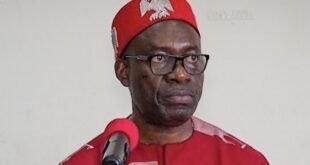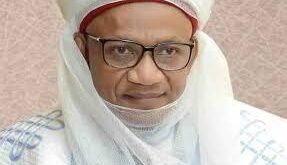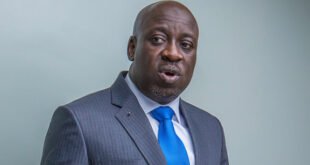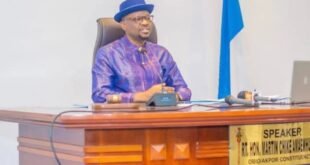It was around 11am on Friday in May, 2025. The scorching sun descended on Government Day Secondary School Dundaye at Wamakko Local Government Area of Sokoto State. Teachers were engrossed with their respective schedules, as some students gathered under a tree that canopied them from exposure to the harsh weather. It was later learnt that those students were the candidates of West African Examination Council (WAEC) who just concluded their Chemistry examination— waiting for the school principal’s address before leaving for their respective destinations.
Among the students was David Ejike, a Senior Secondary School three (SSS3) student. His facial expression says it all: he looks disturbed and worried after he did his WAEC Chemistry practical examination without access to practical tools because his school laboratory lacked equipment to aid students during their learning or during examination.
“The specimen they gave us during our Chemistry WAEC examination is not complete due to the lack of it in our laboratory—some chemicals given weren’t complete,” he said.
Apart from the WAEC examination, Ejike recounted that students were denied the opportunity to carry out practical classes and experiments due to non-available laboratory materials, poor maintenance and poor condition of the facility.

Entrance of Science Laboratory at Government Day Secondary School Dundaye under lock. Credit: Abdulrasaq Kamaldeen
“Due to lack of chemicals and maintenance of our Chemistry lab, we couldn’t do most practicals. Because we don’t have a functioning laboratory, we don’t have the opportunity to practice what we learnt in the class.”
A visit to the school laboratory showed that the facility was neglected and in a poor condition. The laboratory is dusted, housing reptiles and insects, with traces of cobwebs hanging all over the wall. There is neither chemicals nor equipment that are primarily necessary to facilitate the practical skills of the students.
The significance of active laboratories can never be overlooked in aiding students’ research while implementing what they were taught in class. A research published by Journal of Education and Practice lent credence to this assertion. It revealed that laboratory teachings make students and researchers learn about the nature of science and technology in order to foster the knowledge of human enterprise of science which further enhances the aesthetic and intellectual understanding of the students. Using laboratories develops scientific knowledge among students and improves practical learning.
Schools without laboratories where students carry out Biology, Chemistry and Physics practicals would end up producing or graduating students who will have no knowledge of science practicals required by the WAEC and the National Examination Council (NECO) to pass the Senior School Certificate (SSC) examinations, the research added. These students will lack the requisite requirements and qualifications for courses like Medicine, Engineering, Agricultural Science and any of the science-related courses for the future career.
It also emphasises the need for government’s support in constructing and outfitting science labs and recruiting more qualified teachers to ensure the effective operation of the secondary education system in Nigeria.
Insufficient Sitting Materials in Classrooms
It came with signs of dissatisfaction when Naziru Isiaq, another student of Government Day Secondary School Dundaye, felt downturned as he narrated how students suffered different inconveniences because their classes lacked sufficient chairs and tables where students can sit to receive proper learning. He appealed to the government to provide enough sitting materials in order to sit conveniently during class sessions.

Abandoned classroom at Dundaye Primary School
Credit: Abdulrasaq Kamaldeen
“There are times when students’ populations are very high in class. And there are no good chairs for students to sit on. This is one of the problems that affect our studies. We want the government to provide enough chairs and tables for us.”
Corroborating Isiaq’s story, Mr. Suleiman Mohammed, the school’s principal, could not hide the unsatisfactory situation that has been plaguing the proper running of the school. He expressed the dismay which the lack of enough sitting materials have brought to the students.
“We have a classroom problem, especially sitting materials, that is chairs and tables. Despite all the efforts done by the government, it is still not enough. At least we are still managing the situation in our school,” Mr Mohammed said. “When you go to other schools, you see that they don’t have chairs and tables in the classes of learning. In this case, these are things that are not okay at all because chairs and tables are important materials that enhance learning in the classroom,” he added.
To him, the absence of enough seaters has posed daring challenges to students. For example, these students experienced sudden damage to their uniform due to frequent washing every single day, as some of the students found themselves sitting on the floor when there was no chair for them to sit.
“Look at our students. Every day, they wash their uniforms before they come to school. Also when they go back home, they also wash it, because they sit on the floor, they don’t have enough seats to sit. When there’s not enough sitting materials in the class, then how are students expected to write? How are they going to listen to the teacher very well? All these issues bring problems to learning.”
Government Day Secondary School Dundaye is not alone in the struggle, the school condition represents a general problem ravaging many schools in Sokoto communities. Dundaye Primary School and Bakinbilibi Primary School are other schools that have fallen victim to the spell of poor facilities.

Collapsed classroom wall at Dundaye Primary School.
Credit: Abdulrasaq Kamaldeen
A visit to Bakinbilibi Primary School in May showed an appalling situation. Only a single classroom among six classes in the school has a pair of chairs and tables where pupils can sit to receive class.
Auwal Muhammad Inuwa, a Professor of Education from the Department of Educational Foundations, Faculty of Education and Extension Services at Usmanu Danfodiyo University, Sokoto (UDUS), emphasised that inadequate school facilities impacts negative effects on students’ learning and make it difficult for teachers to carry out their duties in the class.
When a school lacks facilities, he said, the teacher will just be manoeuvring the lessons because what he is supposed to use in teaching the topic or subjects is not available, adding, that students will find it difficult to understand what they were taught in class.
“The lack of facilities makes teachers improvise, and where they can’t improvise, they will leave it whether students understand his teaching or not. So, you see, there’s a problem because the topic will not be learnt and it will result in deficiency in learning and content deficiency in covering of the syllabus and curriculum.”
“Playgrounds are also facilities that schools are supposed to have for various types of sports,” he added
Inappropriate school furniture can lead to musculoskeletal disorders in students and pupils, a report published by Tribune Nigeria has shown. It also stated that school furniture can affect the individual and social behaviours of students and cause students to dislike education and dropout from schools. Unfit chairs cause fidgeting, restlessness, and constant movement in many public schools.
Billions of Naira Allocated for Schools Serves Little to no Purpose
In Sokoto State, poor facilities, inactive laboratories, inadequate instructional materials, and shortage of teachers crumble the education system, turning schools to hell for teachers and students/pupils.
In 2023, the Sokoto State government allocated over three billion naira for the capital needs of the State Universal Basic Education Board (SUBEB), which is responsible for the construction, maintenance, and rehabilitation of school buildings and other facilities. In 2024, the government also allocated a total of N4.6 billion to SUBEB.
By the first quarter of 2025, the state government in collaboration with the federal government committed a whopping amount of seven billion naira to upgrade the education sector in the state. This was confirmed by the Sokoto State Chairman, Universal Basic Education Board (SUBEB), Nagwari Umar Tambuwal during a press briefing on Friday, 8th March, 2025.
Despite the huge amount of money being invested in basic education, the school facilities in the Sokoto communities still crawl to develop. The budget serves little to no purpose.

Abandoned Administrative Block at Government Day Secondary School Dundaye.
Credit: Abdulrasaq Kamaldeen
In Government Day Secondary School Dundaye, the administrative block budgeted for construction has been left incomplete since 2023. According to the school’s principal, Mr Mohammed, the administrative block comprises: three classes, principal’s office, vice principal’s office and Examination officer’s office. Also, in Dundaye Primary School, there is an abandoned incomplete project under construction in 2023. However, the conditions of classrooms at Bakinbilibi Primary beg for substantial renovation but see no attention.
This reporter reached out to the Sokoto state’s Ministry of Education to comment on the measures the government is taking to address the problem. However, all efforts proved abortive.
Professor A.L. Ala, the Sokoto State Commissioner for Basic Education, did not respond to multiple calls placed to him. Also, WhatsApp messages and SMS sent to his line were not replied, despite several reminders.
Classrooms With Roofs Blown Off
The only teacher met during this reporter’s visit to Bakinbilibi Primary School, emphasised the dismay their school has been facing since four years ago. He stressed that the pupils can not stay in the class during the rainy season due to the level of dilapidated roofs of the classrooms.
“The condition of the school is affecting the learning situations because there is no probability of full learning due to lack of furniture and poor state of the roofs, especially during the raining season. When it is raining, the learning stops. The classrooms have been dilapidated since about four years ago.”
He further expressed that they have made several complaints to the state government about the condition of the school between 2021 and 2022. However, the government is yet to pay attention to the school. Among the six classes of two blocks in the school, only four classes are manageable.
Speaking on the implications of poor facilities towards education, Professor Inuwa said: “Once a school experiences a shortage of any facilities for learning in the school, it will affect students’ attitudes towards learning.”
For years, education has remained a major problem in Sokoto. Data has shown that 52 percent of the children lack access to schooling. Poor educational facilities accounted for the upsurge of dropout rates in Sokoto State, especially among marginalized communities where two-thirds of children are out of school.
Abandoned Library Begs for Renovation
At Dundaye Primary School, a school library that ought to support pupils with reading and studying materials has turned to a place accommodating dump and refuse. The poor state of the library makes it inaccessible for academic purposes; there is an absence of chairs, tables and reading materials inside the facility.

Neglected Library at Dundaye Primary School. Credit: Abdulrasaq Kamaldeen
Speaking to this reporter, Biliaminu Mohammed, a resident of Dundaye, said he has observed the library being neglected and isolated for years. “This library has been abandoned for years. The school community has informed the government about the poor conditions of the school but nothing has been done so far.”
Research has shown that school libraries are an important part of elementary, middle and high school programmes, without which students would not thrive academically and will invariably find it most difficult to conduct academic research before they reach college level.
A conducive library helps students and pupils to supplement their assignments and class notes while assisting them positively in preparation for their examinations.
Insufficient Instructional Materials, Shortage of Teachers
Research has also revealed that instructional materials—which are used by school administrators, teachers and students—are teachers’ tools for implementing the lesson in the classroom. They are one of the most important educational resources in the school system that are used for supporting the implementation of teaching and learning programmes.
In secondary schools, instructional materials support teaching and learning. Teachers in educational institutions teach well with the deployment of instructional materials. Instructional materials serve as a channel between the teacher and the students in delivering instructions.
In an interview Mr Suleiman Mohammed, the principal of Government Day Secondary School Dundaye, said the absence of instructional materials hindered the learning development in the school.
“Apart from the classroom lessons, there are so many things like instructional materials. We have other things that we show to students so that they will understand our lesson very well.”
He continued: “If a teacher is teaching mathematics, he must go with instruments like compasses that at least will help him to show the student how to use it when designing any triangle, rectangle, and other shapes. So when there’s no teaching materials, you can’t teach very well. Teaching materials like textbooks too are some major things our students do not have access to.”
Speaking further, Mr Mohammed revealed that shortage of teachers is another challenge facing the school. He noted that they write letters to the Ministry of Education, requesting teachers. He added that the school makes use of the members from the National Youth Service Corps (NYSC), volunteers or Teaching Practice (TP) students in order to cover the loophole caused by inadequate teachers.
By: Abdulrasaq Kamaldeen
 JamzNG Latest News, Gist, Entertainment in Nigeria
JamzNG Latest News, Gist, Entertainment in Nigeria










